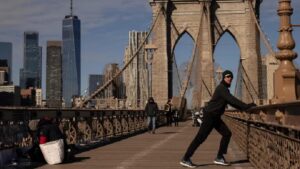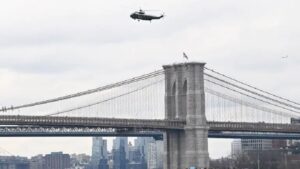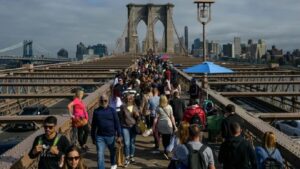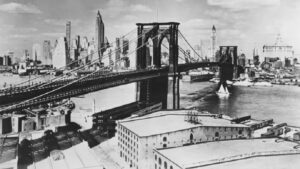Brooklyn Bridge – A Story of German-American Engineering
The Brooklyn Bridge, connecting Brooklyn to Manhattan, is a New York landmark that is crossed daily by tens of thousands of pedestrians and over 100,000 cars. Today marks the 140th anniversary of its opening, designed by a Thuringian engineer.
A Women’s Success Story
The Brooklyn Bridge is a success story for women, as well as a story that forever connects New York and Germany. During his official birthday walk over the Brooklyn Bridge, German Consul General David Gill surprises two tourists from Munsterland with the fascinating history of this New York landmark.
The Roebling Family’s Legacy
Johann August Roebling immigrated to the United States from Muhlhausen, Thuringia as a young man with a group of Muhlhausens. He had already made a name for himself as an engineer with a double-decker steel bridge at Niagara Falls before connecting Brooklyn to Manhattan.
 The bridge is a popular destination for joggers.
The bridge is a popular destination for joggers.
However, Roebling died before the completion of the Brooklyn Bridge, so his son Washington took over and experimented with previously untested air chambers to anchor the two bridge pillars deep in the riverbed. He also struggled with decompression sickness, like many other workers.
Emily Roebling’s Influence
After Washington’s illness, his wife Emily Roebling played a prominent role in the completion of the bridge. She was not an engineer, but she convinced the board responsible for the construction with her political acumen.
 When the helicopter of the US President flies over the Brooklyn Bridge, it is an appealing subject for photographers.
When the helicopter of the US President flies over the Brooklyn Bridge, it is an appealing subject for photographers.
Emily was the first person to cross the new bridge in a horse-drawn carriage, and it remains a breathtaking sight to this day. The Brooklyn Bridge has four galvanized wire strands, each 40 cm thick, that support the bridge’s weight.
The Brooklyn Bridge Today
The Brooklyn Bridge is a testament to German-American engineering and a reminder of the many immigrants who contributed to New York’s iconic cityscape. It is one of the few large bridges in the world with a central pedestrian walkway and remains a popular tourist attraction.
 Pedestrians are offered a spectacular view of the Manhattan skyline on the Brooklyn Bridge.
Pedestrians are offered a spectacular view of the Manhattan skyline on the Brooklyn Bridge.
Mass Panic Shortly After Opening the Brooklyn Bridge
Elke Denecke from Aschersleben finds the Brooklyn Bridge to be an ideal location for taking a photo with the skyline in the background. She and her son Martin Denecke are impressed not only by its beauty but also by its fascinating construction. Martin remarks, “The bridge was built at a time when people were still traveling in carriages or on foot. And now, thousands of cars and trucks drive over it every day, yet the bridge still holds.”
However, New Yorkers did not always share the Deneckes’ confidence in the bridge. Shortly after its opening, a mass panic broke out, resulting in fatalities and injuries. The bridge was the first suspension bridge in America, and its towers were higher than any church towers in the city.
 While the southern tip of Manhattan may have changed over the decades, the Brooklyn Bridge has been shaping the city’s image for 140 years.
While the southern tip of Manhattan may have changed over the decades, the Brooklyn Bridge has been shaping the city’s image for 140 years.
To regain the public’s trust, city politicians looked for a way to demonstrate the bridge’s stability. As General Consul Gill notes, “They came up with the idea of something heavy in the city: elephants.” About a year after the bridge’s opening, a circus director from New York led his 21 elephants and 17 camels across the bridge. From that day on, New Yorkers and Brooklynites believed that the bridge would hold.
There are plans for the Brooklyn Bridge to undergo further expansion and renovation. Edward Mermelstein, New York’s Commissioner for International Relations, hopes that Germany will play a significant role in this process.

